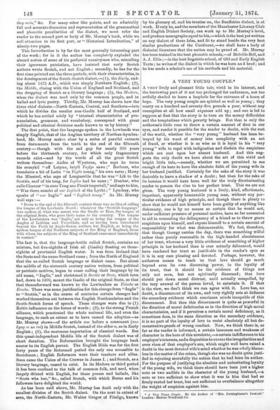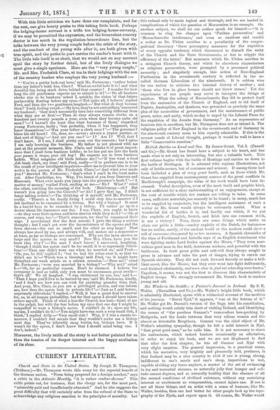A VERY YOUNG COUPLE.*
A VERY lively and pleasant little tale, vivid in its interest, and the harrowing part of it not too prolonged for endurance, nor too
artfully shaded to leave a loophole for the entrance of a beam of hope. The very young couple are spirited as well as young ; they marry on a hundred and seventy-five pounds a year, without any
conception at all how small expenses add up ; and one is led to suppose at first that the story is to turn on the money difficulties and the temptations which poverty brings. But that is only the authoress's little ruse to throw a certain amount of dust in our eyes, and render it possible for the reader to doubt, with the rest of the world, whether the " very young" husband has been be- trayed by his want of money into complicity with an act of fraud, or whether it is as wise as it is loyal in his " very young" wife to repel with indignation and disdain the suspicions which are cast upon her absent husband. And this sug- gests the only doubt we have about the art of this vivid and bright little tale,—namely, whether we are permitted to see enough of its hero to have the absolute faith of the young wife in her husband justified. Certainly for the sake of the story it was desirable to leave a shadow of a doubt ; but then for the sake of
its heroine it would have been well for the truly discriminating reader to possess the clue to her perfect trust. This we are not given. The very young husband is a lively, kind, affectionate, impatient, apparently honourable young man, without any par- ticular evidence of high principle, and though there is plenty to show that he would not himself have been guilty of anything like dishonesty, one is by no means so certain that he would not, under sufficient pressure of personal motive, have so far consented to aid in concealing the delinquency of a friend as to throw grave suspicions upon himself, and expose himself to a certain amount of responsibility for what was dishonourable. We feel, therefore, that though Georgy carries the day, there was something wilful rather than purely reasonable in the high-handed absoluteness of her trust, whereas a very little evidence of something of higher principle in her husband than is ever actually delineated, would have rendered her trust as justifiable in the reader's eyes as it is in any case pleasing and devoted. Perhaps, however, the authoress means to teach us that love should go much beyond even its own discerning power, in the loyalty of its trust, that it should be the evidence of things not only not seen, but not spiritually discerned ; that love should put down moral distrust, until actually compelled, by the very avowal of the person loved, to entertain it. If that is the view, we don't think we can agree with it. Love has, no doubt, a discernment of its own, and very rightly sets at defiance the secondary evidence which convinces minds incapable of this discernment. But then this discernment is quite as powerful in the direction of moral deficiencies as in the direction of high moral characteristics, and if it perceives a certain moral deficiency, as it sometimes does, in the same direction as the secondary evidence, it is no part of the loyalty of love to resist absolutely all but de- monstrative proofs of wrong conduct. Now, we think there is, as far as the reader is informed, a certain looseness and weakness of character in the hero of this novelette,—a certain indifference to his employer's interests, and a disposition to excuse the irregularities and
even vices of that employer's son, which might well have raised a doubt in the most devoted wife's mind whether he was wholly blame- less in the matter of the crime, though she was no doubt quite justi-
fied in rejecting scornfully the notion that he had been its author. For the purpose of justifying the absolute and unhesitating loyalty of the young wife, we think there should have been just a higher note or two audible in the character of the young husband,—a note or two sufficient to show what it was in him that had so firmly rooted her trust, but not sufficient to overbalance altogether the weight of suspicion against him.
S A Very Young Couple. By the Author of "Mrs. Jorninghame's Jouraal." London: Marcus Ward and Co.
With this little criticism we have done our complaints, and for the rest, can give hearty praise to this taking little book. rerhaps the lodging-house servant is a trifle too lodging-house-servanty, if we may be permitted the expression, and the benevolent country _ doctor is too much in the regulation-benevolence line, but the talks between the very young couple before the crisis of the story, and the conduct of the young wife after it, are both given with true spirit, and the pathetic part carries the reader's heart with it. The little tale itself is so short, that we would not on any account spoil the story by further detail, but of the lively dialogue we must give a single specimen. Here are the " very young couple," Mr. and Mrs. Frederick Clare, at tea in their lodgings with the son of the country banker who employs the very young husband :—
" 'You've a pretty look-out here,' said Mr. Fortescue ; rather better than my father's bank has, Clare ? What an awful hole it is ! and what dreadful fun being stack down behind that counter ! I wonder for how long the old gentleman expects me to submit to it? - Do all bankers clerks rise to be bankers,' asked I, quickly, the vision 'of that future partnership floating before my eyes.—' Not quite all, I believe,' replied Fred, and then the two gentlemen laughed.—' But what do they become then? ' I said, feeling vexed.—' My love, they're not caterpillars,' answered my husband; 'they don't necessarily turn into something different from what they are at first.'—' Then do they always remain clerks on a hundred and twenty pounds a year, even when they become quite old
men ? I haven't the least idea what becomes of them,' remarked
young Fortescue, lazily ; 'but probably, when it has happened, they know themselves.'—' Was your father a clerk once ? - The governor?
bless his old heart ! Oh, dear, no—never ; always a junior partner, or that sort of thing.'—' And are you one?'—' I? Am I? Well, that I don't know. If I am, I shall pretty soon cut the concern ; but I opine I am only learning the business. My father is not pleased with me just at the present moment, Mrs. Clare, and thinks it of great import- ance that I shall form business habits ; so he has put me into the bank pour passer le temps, poor old boy l He expects me to form business habits. What sanguine old birds fathers are ! '—'If you want a bond fide bank clerk, my dear,' said Fred, coolly—' if to produce one is to be the result of your intelligent inquiries—allow me to present him to your -notice in the person of Mr. Frederick Clare.'—' And what ever made you ?' drawled Mr. Fortescue ; that's what I can't in the least make out. After Cambridge, too. Why, I've heard of you from Danvers and
Harcourt. What ever made you jump into the governor's bank ? A matter of money,' replied Fred, smiling at Eh ? What ?' cried the other, catching the meaning of the look. 'Matri-mony—oh ? But weren't you going into the Church? '= Al I I gave that up. I didn't fancy taking orders.'—'I'm thinking of it myself,' said Mr. Fortescue, coolly. There's a fat family living I could step into to-morrow if I felt inclined to be examined by a bishop. But why a bishop? It must be a horrid bore to be examined by a bishop. I'd rather go up to a doctor about life insurance any day. I say, Clare, you ought to know
—do they wear their aprons and lawn sleeves while they do it ? Oh of course, and wigs, too.'—' That's nonsense, for they've renounced their wigs. I ascertained that the first minute I gave the thing a serious thought ; but I can't get over the inconsistency of the aprons and the lawn sleeves—the one so small, and the other so very large! That always has stood by me, and always will, and makes me a democrat— at least, as far as bishops are concerned. Why are the lawn sleeves so large and the aprons so very small ? Now Mrs. Clare, have you the
least idea why ? I'm sure I don't know,' I answered, laughing, 'though I think the apron can't be too small, it is so supremely ridicu- lous.'—' That one didn't wear one when he married us,' said Fred.- ' Oh, yes, he did,' replied I; ' but he had his robes over it, so that we didn't see Which was a blessing,' said Fred, ' as it might have disturbed our weak minds on a solemn occasion.'—' Dear me I ' cried Mr. Fortescue ; were you married by a bishop?'—' Why not ?' asked
Oh, for no particular reason. Don't be alarmed. I believe the ceremony is just as valid, only you must be uncommon great swells— that's all.' We all laughed. was christened by one, too,' said I.—
'Then I hope you'll live to be buried by one,' said Mr. Fortescue, kindly, and I don't see how you can wish for anything grander than that. And pray, Mrs. Clare, as you are a privileged person, and can inform me, how does the apron look in private life ? '—' Just as I said before, supremely ridiculous,' I replied.—' Well, it has a great deal to answer for, as, in all human probability, but for that apron I should have taken orders myself. Think of what a loss the Church has had—think of me in the pulpit, but with the fear before my eyes that one day I might be compelled to wear a bishop's apron. I couldn't do it ; upon my life, ma'am, I couldn't do You might have run such a very small risk, I think,' I replied drily.' Very small risk ! Why, if I was a curate to- morrow. I couldn't feel secure that they wouldn't make me a bishop next day. They've tolerably snug berths, too, bishops have. If it wasn't for the apron, I don't know that I should mind being one. I don't, indeed."
Moreover, the lively rattle of the story is not better painted for us than the tension of its deeper interest and the happy exultation of its close.



































 Previous page
Previous page